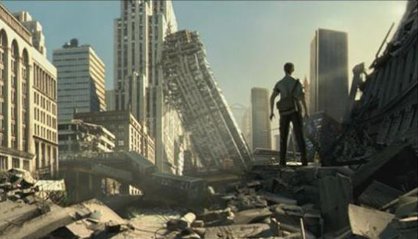
Chicago Mayor Rahm Emanuel, after winning reelection, pronounced Chicago "the greatest city in America." Run by Democrats for more than eight decades, Chicago should serve as a showplace that reflects the wonderful world of "progressive policies."
Public schools are a mess, and the city's finances place their bonds at near junk level. In 2013, the city averaged 36 homicides a month, with the majority of them unsolved.
CNN aired a series on Chicago called "Chicagoland," starring the city's dynamic mayor. Presumably, Emanuel thought it would show off the mayor as he tackled the city's problems. Why, if the man his own mom calls "Rahmbo" can lead Chicago as a prosperous, well-run city, imagine the job he'd do as president of the United States. But the idea backfired -- and not because Emanuel isn't dynamic or hard-working.
The eight-part series showed a beleaguered city, struggling to get by on limited funds. In one episode, a valiant but embattled inner-city high school principal literally maps out "safe passage zones" -- routes her students could take to and from school to avoid gang violence. Think of it. A public school principal literally advising students on how they can go to and from school -- without getting shot.
Welcome to Chicagoland.
A recent piece in the National Journal pronounced Chicago a "broken city:" "Perhaps more than any other major city in America, Chicago is facing a truly grave set of problems -- problems that are essentially more extreme versions of the challenges confronting city governments across the country.
"The quandaries begin with Chicago's dramatic social divide. To an even greater extent than is the case in, say, New York or Philadelphia, Chicago has become two entirely separate cities. One is a bustling metropolis that includes the Loop, Michigan Avenue's Magnificent Mile, and the Gold Coast, as well as the city's well-to-do, working-class, and upwardly mobile immigrant neighborhoods. The other Chicago consists of impoverished neighborhoods on the far South and West Sides, primarily populated by African-Americans. These places have remained beyond the reach of the city's recovery from the Great Recession.
"Meanwhile, even as it grapples with this extreme gap, Chicago is suffering from a severe fiscal crisis. Like plenty of other municipalities, Chicago lacks the revenue to pay its bills, particularly its pension obligations to city workers. According to a 2013 Pew report, 61 other U.S. cities face similar difficulties, but Chicago's situation is one of the worst. ... If the gaping holes in Chicago's social and fiscal fabric ... can't be fixed ... (t)hen Chicago may end up serving as a cautionary tale about the grim political and economic fate awaiting other U.S. cities that put off or wish away their problems."
About Chicago's finances, Investors Business Daily recently reported: "(Chicago's) financial woes have mounted despite Emanuel's efforts to rein them in. Years, perhaps even decades, of past financial sins all seem to be coming home to roost now. ... Moody's Investors Service estimated in a 2013 report that fixed costs, like pension contributions and debt service, could soon eat up more than half the city's operating budget, up from about 15 percent of the 2015 budget."
With contributions to the city's pension plan for government workers funded at only 34 to 35 percent of their liability -- and since unions resist any cuts or givebacks -- taxes must be a raised to cover the shortfall. Raise taxes on job creators, and they leave. When they leave, they take their taxes with them, contributing to the city's further decline, the so-called "economic death spiral."
Nationwide, 10 percent of all parents have their kids in private schools. In Chicago, 39 percent of public school teachers with school-age children have their kids in private school.
So, what to do? Why, find people from whom more taxes can be extracted, of course. As former Rep. Barney Frank, D-Mass., once put it, "There are a lot of very rich people out there who we can tax."
Economist Stephen Moore writes: "Massachusetts Sen. Elizabeth Warren appeared on one of the late night talk shows last week, beating the class warfare drum and arguing for billions of dollars in new social programs paid for with higher taxes on millionaires and billionaires. In recent years, though, blue states such as California, Illinois, Delaware, Connecticut, Hawaii, Maryland and Minnesota adopted this very strategy, and they raised taxes on their wealthy residents. How did it work out? Almost all of these states lag behind the national average in growth of jobs and incomes. So, if income redistribution policies are the solution to shrinking the gap between rich and poor, why do they fail so miserably in the states?"
When French President Francois Hollande imposed a 75 percent tax on the rich, the rich said adieu. The revenue from his "rich person's tax" fell well short of projections. Turns out, rich people aren't stupid, French or otherwise. But the lessons of France are lost on Chicago. The lessons of Chicago are lost on the American left.
Comment by clicking here.
Larry Elder is a best-selling author and radio talk-show host.



 Contact The Editor
Contact The Editor
 Articles By This Author
Articles By This Author